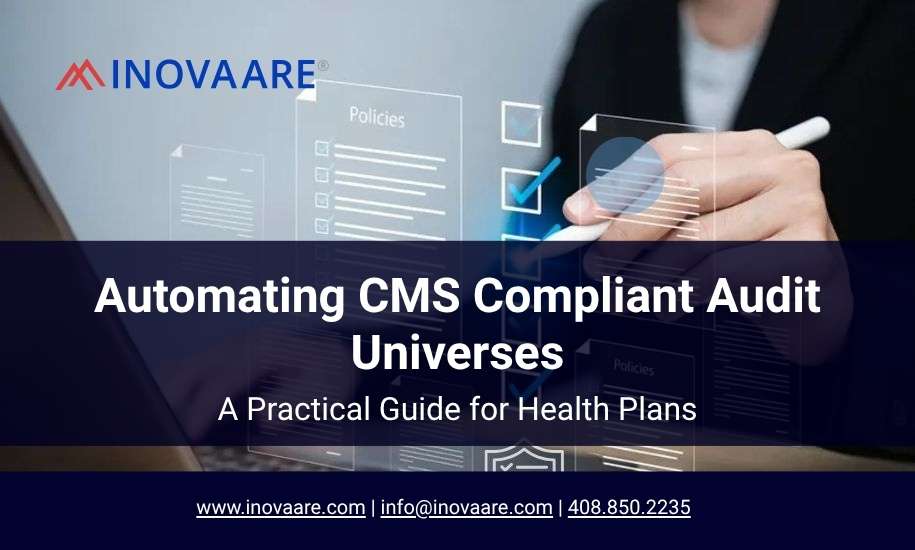Every health plan faces CMS audits as a regulatory requirement, not a surprise event. Yet, for many, preparing CMS compliant Universes remains a complex and often disorganized process, causing last-minute scrambles and exposing them to risks, penalties, and reputational harm.
A CMS compliant audit universe file is not just a data submission; it is a profound reflection of how well your health plan manages regulatory responsibilities. This guide will break down the fundamentals of CMS compliant Universe files and offer precise steps to streamline the process effectively.
Top challenges in preparing CMS-compliant audit universes
Even with the recurring nature of CMS audits, many health plans struggle with key challenges in creating their Universes:
- Manual data pulls: Data often resides across disjointed systems, requiring time-consuming efforts to locate, merge, and organize information within compliance standards.
- Formatting errors: CMS enforced formatting requirements are stringent. Even minor deviations or inconsistencies render a file invalid and cause delays.
- Delegate discrepancies: Many health plans rely on delegated entities for partial submissions. Late or inconsistent data from these entities compromises overall accuracy and compliance.
- Lack of traceability: Without robust audit trails, proving data integrity and demonstrating compliance during audits becomes nearly impossible.
- Reactive processes: Relying on ad hoc submissions instead of proactive planning leads to inefficiencies, errors, and compliance risks.
Best-practices to generate a CMS compliant universes
By adopting a structured approach, health plans can overcome these challenges and build Universe files ready for CMS scrutiny. Here are five actionable strategies:
- Map your data sources early: Conduct a comprehensive review of all systems generating data for each Universe type. Identify internal platforms, delegate systems, and other sources that contribute critical information. Mapping data sources early ensures no gaps or blind spots during compilation.
- Standardize templates and formats: Adopt CMS aligned templates across all teams and First Tier, Downstream, and Related (FDR) entities. Consistent templates reduce errors and ensure that all submissions follow the required formatting standards. Create checks to ensure everyone adheres to these templates in their submissions.
- Automate validation and field mapping: Manual validation processes are labor-intensive and prone to error. Automate these tasks with tools that validate formatting, identify missing fields, and resolve data inconsistencies in real-time. Automating validations can significantly reduce the workload while keeping your submissions error-free.
- Maintain detailed audit trails: Logs showcasing when data was entered, edited, or adjusted, including by whom and for what purpose, are essential. Fully transparent audit trails help prove compliance and simplify regulatory processes.
- Conduct regular dry runs: Holding simulation exercises for audit submissions, such as quarterly dry runs, can reveal bottlenecks or issues early on. These practices provide the opportunity to optimize processes and ensure compliance-readiness year-round.
Explore – CMS Program Audit Readiness Playbook
Key features of an automated universe generation system
When these challenges seem overwhelming, modern tools like Inovaare’s Universe Management System (UMS) provide the technology and support to manage Universe files seamlessly. Purpose-built for CMS compliance, UMS offers:
- Built-in CMS logic validation: Every field within a Universe file is automatically validated against the latest CMS rules and regulations in real time. This reduces rework and ensures accuracy before submission.
- Automated universe file generation: UMS drastically reduces the manual workload by generating submission-ready Universe files within minutes. No more scrambling to meet audit deadlines.
- Centralized delegate management portal: Delegated entities benefit from a secure portal to upload, scrub, and track files. All data is managed cohesively within a centralized ecosystem, simplifying collaboration and maintaining compliance.
- Comprehensive audit trails: UMS captures every interaction with the data in a clear, timestamped log, providing robust defensibility and transparency during CMS audits.
- Real-time dashboards: Track data readiness, file submissions, and overall compliance progress through intuitive dashboards. Proactively address potential gaps before they become an issue. Not sure where you stand? Take the Free Data Readiness Assessment.
How health plans can ensure accuracy and compliance
CMS audits are not optional, but scrambling to meet compliance requirements shouldn’t be part of the process. By adopting a proactive and structured approach, health plans can achieve readiness and accuracy while reducing risks and penalties.
Leveraging innovative technology, Inovaare’s UMS, not only simplifies compliance but also empowers teams to focus on delivering better member care and outcomes.
Ready to streamline universe creation?
Request a demo to see how automated universe workflows can improve compliance, reduce manual all‑nighters, and prepare your plan for CMS audits.
